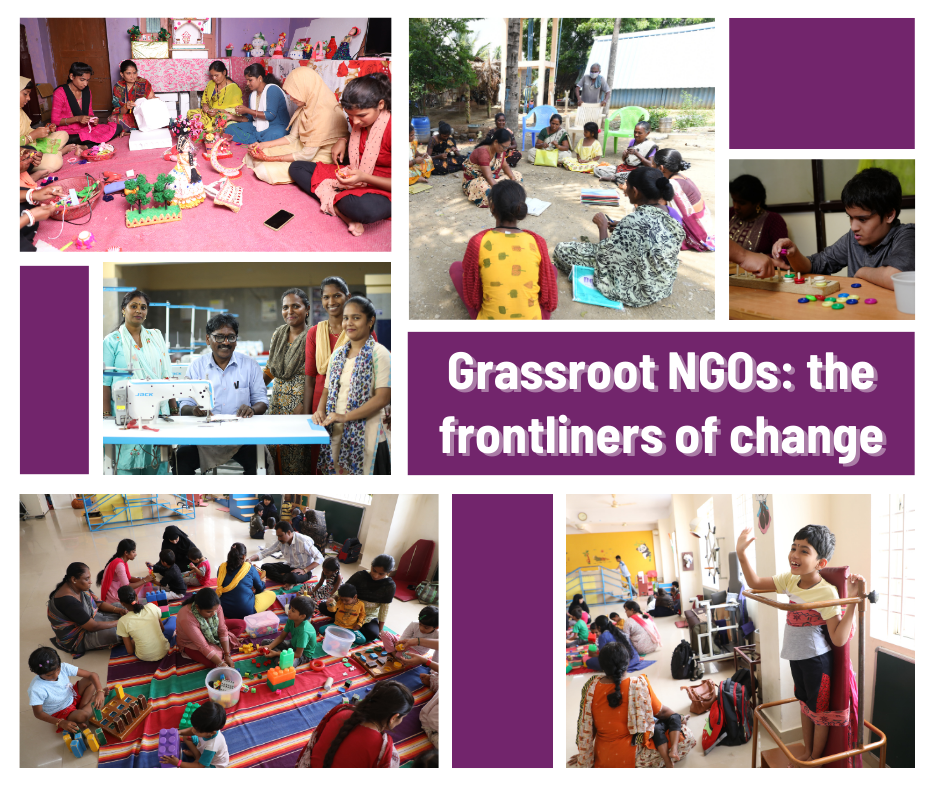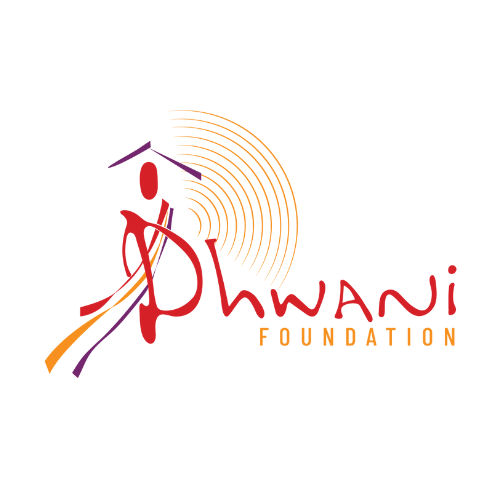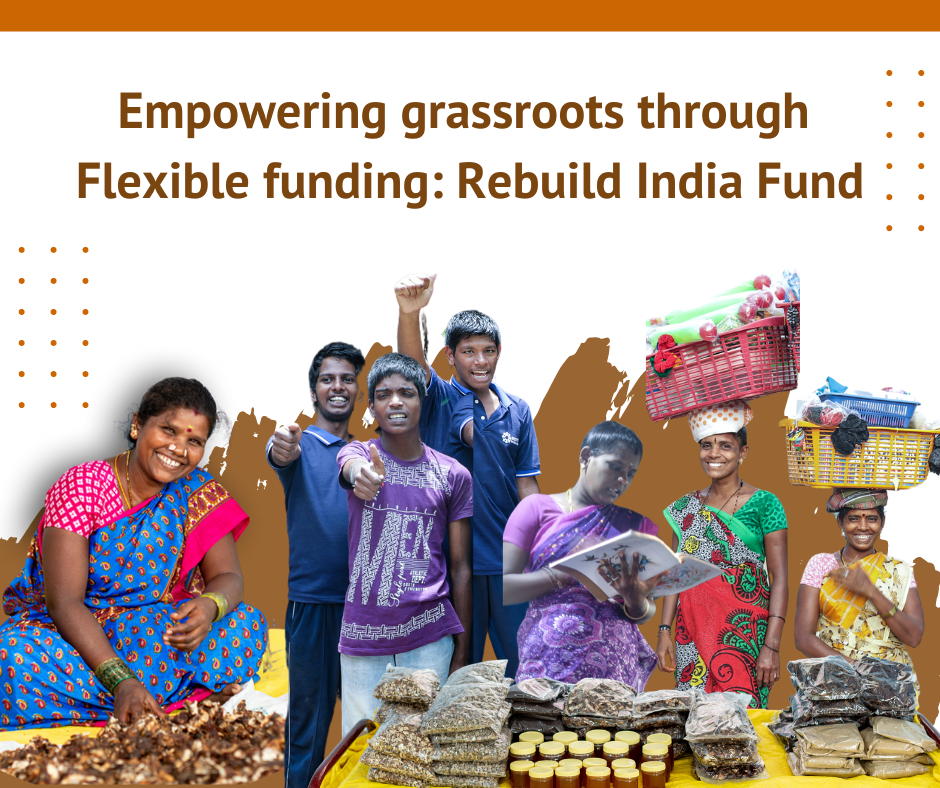
Grassroots NGOs and the special connection with their community
And why Dhwani does what it does.
NGOs are the foundation of the development sector. We are exposed to several of them in our cities – tirelessly working for their chosen cause. But what do we know of the Grassroots NGOs across the country? About the thousands beyond our urban landscape striving to get some visibility for their neglected and often forgotten communities? How do they pick up a cause? How do they mobilise? What drives them? How do they keep going? How do they sustain? These are some questions that Dhwani continues to ask and be interested in, as we delve deeper into the Grassroots NGO world.
Since its inception, Dhwani Foundation has been intrigued and interested in looking at the work of Grassroots NGOs from the inside out. This has translated into a longstanding commitment to enabling and enhancing these NGOs’ role. We do this through a series of OD and capacity-building programmes in areas like compliance, governance, tech support, fundraising, marketing, etc. that the NGOs require to sustain, thus enabling them to continue serving their people through their good work.
In this highly unusual deep engagement and collaborative set-up, we encounter a myriad of stories. A sex worker upon witnessing fatal brutality on her friend, went on to set up and lead an NGO for mental health among sex workers. A trans person who has set up initiatives in safeguarding and protecting their community. The stories and causes are many, but all share a common thread- wanting to help and uplift their underserved community. Of courage, of hope, of helplessness, and of joy- the stories are endless. But none too much. And all too real.
These countless stories of oppression, injustice, marginalisation apathy that transform them to hope and action, are what is most impressive about the NGOs. Each one eventually leads to the story of how and why these NGOs do what they do. This deep-rooted connection and commitment to the community they serve in turn makes us want to play a part in their journey and their strive for impact. Their experiences become a driving force, compelling them to create pathways for a better future. And in turn, fuels us to continue our support to their endeavors.
Here are a few stand out qualities that we’d like to share that Grassroots NGOs have in common even in the most challenging of times.
Attitude to bring change
Grassroots NGOs do not start with an idea, but an attitude towards bringing a change. This attitude, deeply ingrained in the fabric of grassroots NGOs and grassroots NGO leaders, is what provides them with the resilience to challenges and sustain their efforts for the long haul.
Moreover, NGO leaders are contextual, connected to the community, and understand the nuances of the problems they aim to solve. Whether it’s access to education, healthcare, or economic opportunities, these organisations tailor their interventions to suit the specific needs of the people they serve. This tailored approach not only ensures the relevance of their programs but also fosters a sense of ownership and empowerment within the community.
Collaboration Over Confrontation
Grassroots NGOs don’t trash the system, they collaborate with the existing system to extend and ensure impact among the vulnerable communities.
This collaboration brings an awareness of the ‘what, why, and how’ of their work, allowing them to tailor their interventions to address the specific needs of the people.
Zero-Tolerance for Wrongdoing
Grassroots NGOs embody a commitment to positive change that goes beyond the ordinary. They operate with a zero-tolerance policy for anything wrong, holding themselves to the highest standards of integrity and ethics.
Unwavering passion
For those engaged in grassroots NGOs, it’s more than just a job—it’s a calling, a mission that transcends the boundaries of conventional employment. Driven by an unwavering passion, they persevere, facing challenges head-on with a determination that knows no bounds.
Community driven
Grassroots NGOs view vulnerable communities not as problems to be solved but as individuals with unique needs and aspirations. When addressing issues, they focus only on the community making community participation not just a checkbox but a fundamental principle.
In the intricate network of societal progress, grassroots organisations function as capillaries, ensuring that higher-level government decisions and resources flow seamlessly to each rightful citizen. Unlike larger, more centralised entities, they operate on the principle that solutions to community problems are best crafted by those who intimately understand and face these issues. They are, in essence, the pulse of the community, responding to its needs with an agility and understanding that larger organizations often lack.
Change is an ongoing process, but grassroots NGOs create demand for that change from within the community, empowering individuals to actively participate in their own development. Respecting community beliefs and maintaining dignity, grassroots NGOs intricately influence the thought of change. And once the thought originates within the community, they work hand in hand to bring that change.
Crucially, we need grassroots organisations because they provide primary, real data. This authentic data, grounded in the lived experiences of the community, offers a more accurate and nuanced understanding of the challenges and opportunities present. It becomes the foundation on which the social sector stands.
By what grassroots organisations do and achieve, they become the champions of community-driven change, embodying the spirit of collaboration, humility, and genuine understanding, firmly rooted in the very soil they aim to nurture. They don’t just exist; they persist, fueled by a passion for justice and a vision of a more just world.
In the world of grassroots NGOs, it’s not just about making a difference—it’s about fostering sustainable, community-driven change.
Having spent 18 years in the social sector, we are intrigued by the extraordinary, yet invisible role grassroots NGOs play in the dynamics of social development and that is why we can’t help seeing them and talking about them as special!

